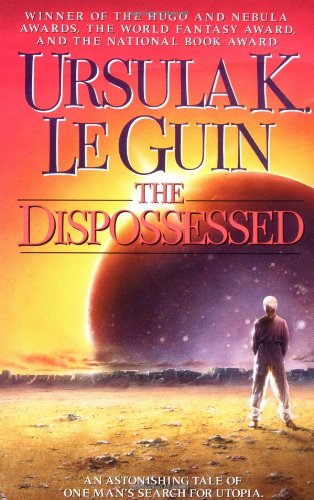Obviously everyone knows that Ursula Le Guin is Taoist (I mean it philosophically, not religiously). The Dispossessed is part Ying-Yang, part hypothetical communism/utopia/anarchism, part a reflection of 1970s political protests and movements. But that's not what had my attention. As a Chinese person, all that communist theories and fantasies on the planet Anarres are not unfamiliar. Actually most of the book seems a bit slow and boring. The opposite of Anarres, the capitalist twin planet Urras, is a bit pale and insubstantial (odd considering that it is based on her most familiar reality) except the explosive violence at the end that recalls the real-life time and events. OK, all that is fairly straightforward social sci fi.
Again I have to bring up my cultural background as a Chinese person because the way she describes a not-so-perfect utopian Anarres. There is no law on Anarres, and people enforce social order by customs and social pressure on conformity. It seems nice on the surface that people cooperate willingly and voluntarily, but it is suffocating individualism and free thoughts. The tyranny of the majority. Conformance enforced by the threat of isolation and rejection. Perhaps she modeled it on what she learned of the Soviet society, but it really fits much more snugly in the conventional (not even communist) Chinese society. No laws. No rules. Just soft and intangible pressure to purge the individualism out of you. The bloodless violence and coercion. The smiling cruelty. I began to feel disturbed reading the Anarresti chapters in the second half of the novel because I was reminded of the society built on a mix of communist and Confucianist ideologies in which I grew up, plus the material scarcity and hardship the struggles every working family went through.
The ending doesn't quite work but one has the suspicion that any kind of resolution would be false in this story. The violence is a bit jarring in the otherwise subdued and undramatic novel overall, but I could feel an appropriate rage that must have come out of the Vietnam War.
I generally like Le Guin but do not love her novels, because her characters are not particularly memorable to me, perhaps because they are not particularly emotionally vulnerable. The only exception is George Orr in "The Lathe of Heaven" (my favorite of hers). The main characters in "The Lefthand of Darkness", "The Dispossessed", and the first Earthsea book were all nondominant men who left almost no impression on me. The female characters neither. Sorry.
Another interesting tidbit about "The Dispossessed" is bits of homosexuality casually thrown in. The novel was written in 1973, about the same time APA removed it from DSM in a highly contentious vote among delegates. In Le Guin's anarchist utopia, children experiment with various kinds of sexual partnering in their youth. She approached the issue of sex and homosexuality with the attitude of a true anarchist and a flower child of the 1960s and, of course, a Taoist.


No comments:
Post a Comment